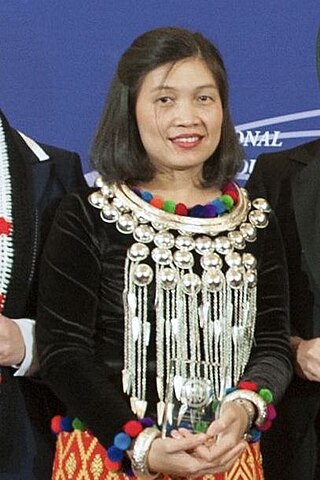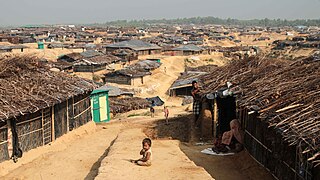| |||||
| Decades: | |||||
|---|---|---|---|---|---|
| See also: | |||||
The following lists events that happened in 2014 in the Republic of the Union of Myanmar .
| |||||
| Decades: | |||||
|---|---|---|---|---|---|
| See also: | |||||
The following lists events that happened in 2014 in the Republic of the Union of Myanmar .

Myanmar, officially the Republic of the Union of Myanmar and also known as Burma, is a country in Southeast Asia. It is the largest country by area in Mainland Southeast Asia and has a population of about 55 million. It is bordered by India to its west, Bangladesh to its southwest, China to its northeast, Laos and Thailand to its east and southeast, and the Andaman Sea and the Bay of Bengal to its south and southwest. The country's capital city is Naypyidaw, and its largest city is Yangon.

Human rights in Myanmar under its military regime have long been regarded as among the worst in the world. In 2022, Freedom House rated Myanmar’s human rights at 9 out 100.

The Rohingya people are a stateless ethnic group who predominantly follow Islam and reside in Rakhine State, Myanmar. Before the Rohingya genocide in 2017, when over 740,000 fled to Bangladesh, an estimated 1.4 million Rohingya lived in Myanmar. Described by journalists and news outlets as one of the most persecuted minorities in the world, the Rohingya are denied citizenship under the 1982 Myanmar nationality law. There are also restrictions on their freedom of movement, access to state education and civil service jobs. The legal conditions faced by the Rohingya in Myanmar have been compared to apartheid by some academics, analysts and political figures, including Nobel laureate Bishop Desmond Tutu, a South African anti-apartheid activist. The most recent mass displacement of Rohingya in 2017 led the International Criminal Court to investigate crimes against humanity, and the International Court of Justice to investigate genocide.
Many adherents of Buddhism have experienced religious persecution because of their adherence to the Buddhist practice, including unwarranted arrests, imprisonment, beating, torture, and/or execution. The term also may be used in reference to the confiscation or destruction of property, temples, monasteries, centers of learning, meditation centers, historical sites, or the incitement of hatred towards Buddhists.
There is a history of persecution of Muslims in Myanmar that continues to the present day. Myanmar is a Buddhist majority country, with significant Christian and Muslim minorities. While Muslims served in the government of Prime Minister U Nu (1948–63), the situation changed with the 1962 Burmese coup d'état. While a few continued to serve, most Christians and Muslims were excluded from positions in the government and army. In 1982, the government introduced regulations that denied citizenship to anyone who could not prove Burmese ancestry from before 1823. This disenfranchised many Muslims in Myanmar, even though they had lived in Myanmar for several generations.

Insurgencies have been ongoing in Myanmar since 1948, when the country, then known as Burma, gained independence from the United Kingdom. It has largely been an ethnic conflict, with ethnic armed groups fighting Myanmar's armed forces, the Tatmadaw, for self-determination. Despite numerous ceasefires and the creation of autonomous self-administered zones in 2008, armed groups continue to call for independence, increased autonomy, or federalisation. It is the world's longest ongoing civil war, spanning almost eight decades.
The 2012 Rakhine State riots were a series of conflicts primarily between ethnic Rakhine Buddhists and Rohingya Muslims in northern Rakhine State, Myanmar, though by October Muslims of all ethnicities had begun to be targeted. The riots started came after weeks of sectarian disputes including a gang rape and murder of a Rakhine woman which police allege was committed by three Rohingya Muslims. On 8 June 2012, Rohingyas started to protest from Friday's prayers in Maungdaw township. More than a dozen residents were killed after police started firing. A state of emergency was declared in Rakhine, allowing the military to participate in administration of the region. As of 22 August 2012, officially there were 88 casualties: 57 Muslims and 31 Buddhists. An estimated 90,000 people were displaced by the violence. Around 2,528 houses were burned; of those, 1,336 belonged to Rohingyas and 1,192 belonged to Rakhines.

Bodu Bala Sena, also abbreviated as BBS is a far-right anti-liberalist, and ultranationalist Sinhalese Buddhist organization, and a break-away faction from the right-wing nationalist Jathika Hela Urumaya party. The BBS generally opposes pluralist and democratic ideologies, and criticizes non-extremist Buddhist monks for not taking action against the rise of other religions within Sri Lanka.
The 2012 Ramu violence refers to a series of attacks on Buddhist monasteries, shrines, and houses of Buddhist inhabitants in Ramu Upazila in Cox's Bazar District in Bangladesh by local mobs on the midnight past 29 September 2012. The mobs destroyed 12 Buddhist temples and monasteries and 50 houses in reaction to a tagging of an image depicting the desecration of a Quran on the timeline of a fake Facebook account under a Buddhist male name. The actual posting of the photo was not done by the Buddhist who was falsely slandered. The Buddhist was innocent of the accusation. The violence later spread to Ukhia Upazila in Cox's Bazar District and Patiya Upazila in Chittagong District where Buddhist monasteries and Hindu temples were targeted for attacks.

Crime in Thailand has been a defining issue in the country for decades, inspiring years of policy and international criticism. Drug use and corruption make up the majority of the crime in Thailand and due to this, many Thai administrations attempted to curtail the drug trade, most notably Thaksin Shinawatra with the 2003 War on Drugs. Since 2003 crime has been decreasing with the crime rate decreasing from 9.97 to 2.58. Despite this, juvenile delinquency has been increasing in recent years.
Buddhist scripture condemns violence but varying textual interpretations has been used to allow it. Ahimsa, a term meaning "not to injure", is a primary virtue in Buddhism. However, Buddhists have historically used scriptures to justify violence or form exceptions to commit violence for various reasons. As found in other religious traditions, Buddhism has an extensive history of violence dating back to its inception.

The 969 Movement is a Buddhist nationalist movement opposed to what they see as Islam's expansion in predominantly Buddhist Myanmar (Burma). The three digits of 969 "symbolize the virtues of the Buddha, Buddhist practices and the Buddhist community". The first 9 stands for the nine special attributes of the Buddha and the 6 for the six special attributes of his Dharma, or Buddhist Teachings, and the last 9 represents the nine special attributes of Buddhist Sangha. Those special attributes are the Three Jewels of the Buddha. In the past, the Buddha, Sangha, Dhamma, the wheel of Dhamma, and "969" were Buddhist signs.
The 2013 Myanmar anti-Muslim riots were a series of conflicts in various cities throughout central and eastern Myanmar (Burma).
Ashin Wirathu is a Burmese Buddhist monk, and the leader of the 969 Movement in Myanmar. He has incited the persecution of Muslims in Myanmar through his speeches. Facebook banned his page on the charge of allegedly spreading religious hatred towards other communities, after repeated warnings to not post religiously inflammatory content.

May Sabai Phyu is a Kachin activist from Burma. She is active in promoting human rights, freedom of expression, peace, justice for Myanmar's ethnic minorities, anti-violence in Kachin State, and lately in combating violence against women and promoting gender equality issues.

In 2015, hundreds of thousands of Rohingya people were forcibly displaced from their villages and IDP camps in Rakhine State, Myanmar, due to sectarian violence. Nearly one million fled to neighbouring Bangladesh and some travelled to Southeast Asian countries including Malaysia, Indonesia, Cambodia, Laos and Thailand by rickety boats via the waters of the Strait of Malacca, Bay of Bengal and the Andaman Sea.

The Patriotic Association of Myanmar, abbreviated Ma Ba Tha (မဘသ) in Burmese and variously translated into English as Association for the Protection of Race and Religion, Organisation for the Protection of Race and Religion and Committee for the Protection of Nationality and Religion is an ultra-nationalist Buddhist organisation based in Myanmar (Burma). Some PAM members are connected to the 969 Movement.
The following lists events in the year 2017 in Myanmar.

The Rohingya genocide is a series of ongoing persecutions and killings of the Muslim Rohingya people by the military of Myanmar. The genocide has consisted of two phases to date: the first was a military crackdown that occurred from October 2016 to January 2017, and the second has been occurring since August 2017. The crisis forced over a million Rohingya to flee to other countries. Most fled to Bangladesh, resulting in the creation of the world's largest refugee camp, while others escaped to India, Thailand, Malaysia, and other parts of South and Southeast Asia, where they continue to face persecution. Many other countries consider these events ethnic cleansing.
The 2015 Race and Religion Protection Laws are a series of 4 controversial laws passed in Myanmar. The laws were drafted in 2013 and pushed by the Committee for the Protection of Nationality and Religion, or Ma Ba Tha. They include the Population Control Law, the Mongogamy Law, the Religious Conversion Law, the Interfaith Marriage Law.